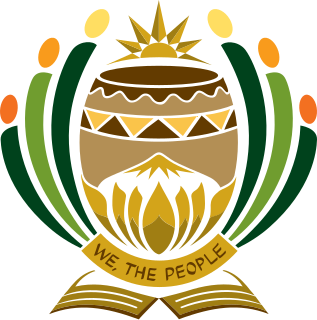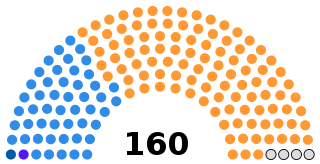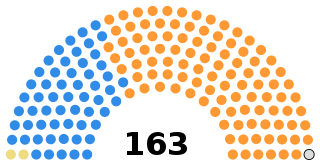Related Research Articles
Elections to determine the makeup of the legislative bodies on the three levels of administrative division in the Kingdom of Sweden are held once every four years. At the highest level, these elections determine the allocation of seats in the Riksdag, the national legislative body of Sweden. Elections to the 20 county councils (landsting) and 290 municipal assemblies (kommunfullmäktige) – all using roughly the same electoral system – are held concurrently with the legislative elections on the second Sunday in September.
The Progressive Party of Canada was a federal-level political party in Canada in the 1920s until 1930. It was linked with the provincial United Farmers parties in several provinces, and it spawned the Progressive Party of Saskatchewan, and the Progressive Party of Manitoba, which formed the government of that province. The Progressive Party was part of the farmers' political movement that included federal and provincial Progressive and United Farmers' parties.

The Canadian federal election of 1921 was held on December 6, 1921, to elect members of the House of Commons of Canada of the 14th Parliament of Canada. The Union government that had governed Canada through the First World War was defeated, and replaced by a Liberal government under the young leader William Lyon Mackenzie King. A new third party, the Progressive Party, won the second most seats in the election.

The Parliament of South Africa is South Africa's legislature and under the country's current Constitution is composed of the National Assembly and the National Council of Provinces.

The Croatian People's Party – Liberal Democrats is a liberal political party in Croatia.
Armagh or County Armagh was a parliamentary constituency in the House of Commons. It was replaced in boundary changes in 1983.
Elections in South Africa are held for the National Assembly, provincial legislatures and municipal councils. Elections follow a five-year cycle, with national and provincial elections held simultaneously and municipal elections held two years later. The electoral system is based on party-list proportional representation, which means that parties are represented in proportion to their electoral support. For municipal councils there is a mixed-member system in which wards elect individual councillors alongside those named from party lists.
Regular elections in Croatia are mandated by the Constitution and legislation enacted by Parliament. The presidency, Parliament, county prefects and assemblies, city and town mayors, and city and municipal councils are all elective offices. Since 1990, five presidential elections have been held. During the same period, nine parliamentary elections were also held. In addition, there were six nationwide local elections. Croatia has held two elections to elect 11 members of the European Parliament following its accession to the EU on 1 July 2013.
Elections in Greece gives information on elections and election results in Greece.

There are three types of elections in Nepal: elections to the Federal Parliament, elections to the state assemblies and elections to the local government. Within each of these categories there may be by-elections as well as general elections. Currently two electoral systems are used: parallel voting for House of Representatives and provincial assemblies and first past the post for local elections.

Parliamentary elections were held alongside presidential elections in Croatia on 2 August 1992, the first after independence and under the new constitution. All 138 seats in the Chamber of Representatives were up for election. The result was a victory for the Croatian Democratic Union, which won an absolute majority of 85 seats. Voter turnout was 75.6%.

The 1961 South African general election, held on 18 October of that year, was the first general election after South Africa became a republic following the 1960 South African referendum. The National Party under Hendrik Frensch Verwoerd won a majority in the House of Assembly.

The 1958 South African general election, held on 16 April of that year, led to a victory for the National Party, under the leadership of J.G. Strijdom, which took 103 seats in the House of Assembly. It was the first election in South Africa with a whites-only electorate, following the removal of the Cape Qualified Franchise in the late 1950s to be replaced by four (white) MPs elected to represent Coloured voters in separate constituencies.

The 1966 South African general election, on 30 March 1966, resulted in another comprehensive victory for the National Party under Hendrik Frensch Verwoerd.

The State Constitution of Bosnia and Herzegovina (BiH) and the entity Constitutions of the Federation of Bosnia and Herzegovina and the Republika Srpska provide for freedom of religion, and the Government generally respects this right in ethnically integrated areas or in areas where government officials are of the majority religion; the state-level Law on Religious Freedom also provides comprehensive rights to religious communities. However, local authorities sometimes restricted the right to worship of adherents of religious groups in areas where such persons are in the minority. 54% of Herzegovinian and Bosnian Muslims consider themselves as "just muslims".
General elections were held in Bosnia and Herzegovina on 18 November 1990, with a second round of voting in the House of Peoples elections on 2 December. These were the final general elections to be held in Bosnia and Herzegovina while it was still a constituent republic of the Socialist Federal Republic of Yugoslavia.

The Electoral system of Turkey varies for general, presidential and local elections that take place in Turkey every four years, five years and five years respectively. Turkey has been a multi-party democracy since 1950, with the first democratic election held on 14 May 1950 leading to the end of the single-party rule established in 1923. The current electoral system for electing Members of Parliament to the Grand National Assembly has a 10% election threshold, the highest of any country.

General elections were held in Vanuatu on 22 January 2016. The previous elections occurred in October 2012. The president of Vanuatu, Baldwin Lonsdale, dissolved the Parliament of Vanuatu in November 2015. This occurred after the conviction of 14 parliamentarians for bribery. The convicted MPs include former Prime Ministers Serge Vohor and Moana Carcasses Kalosil. The president called for a snap election to form a new government.
References
- ↑ Gavrić, Saša; Banović, Damir (2012). PARLAMENTARIZAM U BOSNI I HERCEGOVINI. Sarajevo: Sarajevski otvoreni centar, Fondacija Friedrich Ebert.
- ↑ "Парламентарна скупштина Босне и Херцеговине". Parlamentarna skupština Bosne i Hercegovine. Retrieved Dec 9, 2014.